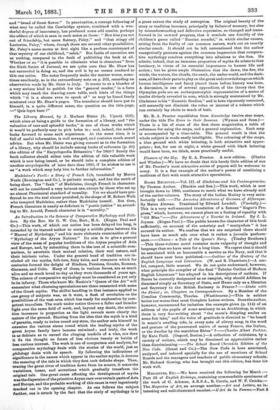Juvenal, Persius, Martial, and Catches. An Experiment in Trans- lation.
By W. F. Shaw, M.A. (Kegan Paul and Co.)—The question whether it is desirable to render these four poets (or, as Mr. Shaw in one place calls them, "these amusing writers ") "attractive in Eng- lish" for the benefit of the general reader, will obviously depend on. the amount of taste and discretion possessed by the translator, of which we shall speak presently. Being of opinion that the prose- translator must sacrifice "the pleasure of the reader to fidelity to the- text," while in verse translations "the exact meaning often has to be- sacrificed to the exigencies, of rhyme" (of which, as is truly re- marked, "there is none in the original"), Mr. Shaw has adopted an unrhymed "trochaic, octosyllabio " metre, which will be re- cognised, though in some cases with difficulty, as the metre of "Hiawatha." The extent to which Mr. Shaw haa been able to com- bine the merit, of both styles may be fairly judged from his rendering of .Tuvenal, iii., 299-308 :—
" Nob's free -Ion of the poor man! Isn't he free to get well cudgellei? Isn't he free to bez permission
To get home to bed, before his Few remaining • eeth are kno •ked oat ? Worse than all remain the burglar Who will rob you when work's over, And the shop-door is chain-bolted 'sic], And to cut your th•-o it, the footpad Then it is these fish discover That the best baits in the city."
The felicity of the last two lines is especially noticeable. Among- isolated specimens of Mr. Shaw's mastery over his metre, we award the palm, after some consideration, to "Juno was a maid, then.;: and Jove," "His nail to the quick; come hither," and "A cross- sometimes, sometimes a crown," the effact of which we consider superior to that of passing a lawn-mower over a rockery. The spelling of the volume is occasionally eccentric, as in "donned her whig," and "bread of finest flower." In punctuation, a corrupt following of what may be called the Cambridge system, combined with a won- .derful degree of inaccuracy, has produced some odd results, perhaps the oddest of which is seen in such notes as these : "Men kiss you not -out of friendship, but mere flattery, Paley," and "that stingy old Laetorius, Paley," where, though there are several other possibilities, Mr. Paley's name seems at first sight like a profane counterpart of that mystery of our childhood, " selah." But faults of execution are as nothing, compared to the fault of publishing the book at all. Whether or no "it is possible to eliminate what is obnoxious" from the Sixth Satire of Juvenal, we are quite sure that Mr. Shaw has mot succeeded in doing so, and the evil is by no means confined to this one satire. The notes frequently make the matter worse, some- times needlessly, as in the extraordinary note on p. 262, recording an -observation made by Mr. Shaw in Italy. It seems to us a blunder of -a very serious kind to publish for the "general reader," in a form which may reach the drawing-room table, such hints of the things which "it is a shame even to speak of" as may be found freely scattered over Mr. Shaw's pages. The translator should have put to himself, in a quite different sense, the question on the title-page, —" Quis leget haec ?"



































 Previous page
Previous page